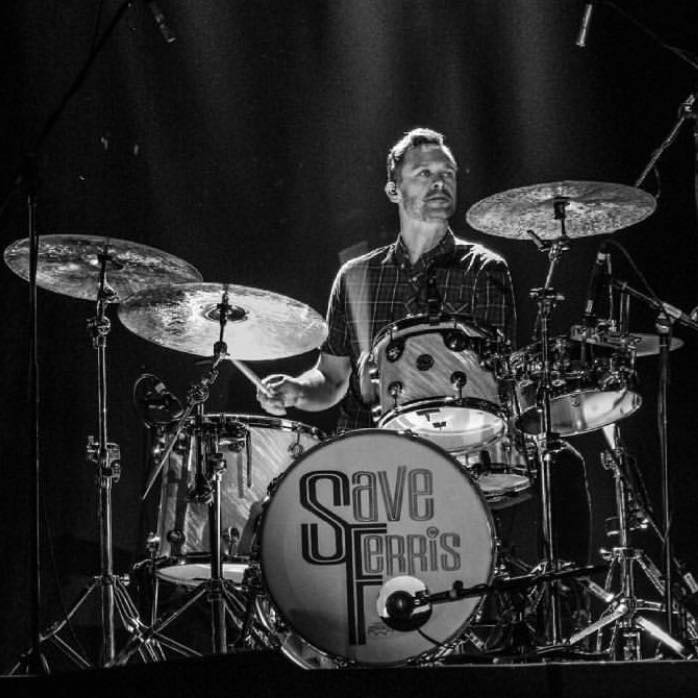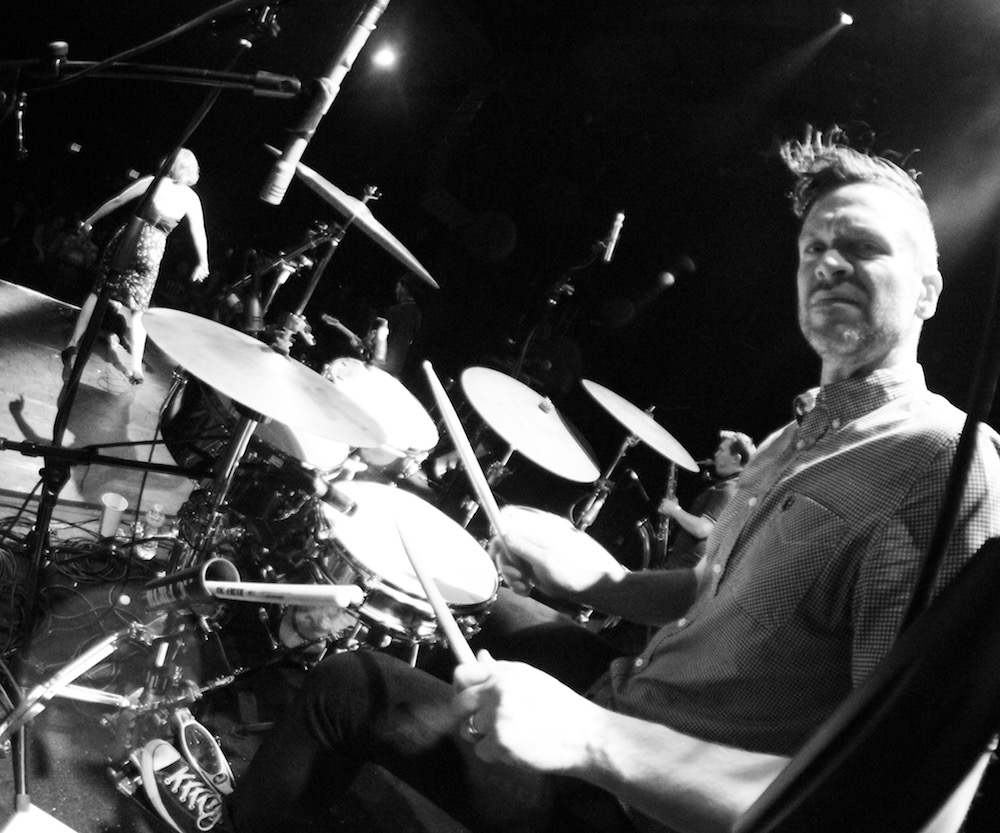On The Beat With Brandon Dickert of Save Ferris

How Not To Fail as a Professional Musician
When I was fourteen and had been drumming for a few years, my slightly older, wiser neighbor Tim came by my house and gave me a gift I still own to this very day. Tim was already an accomplished drummer, and it was great to have someone in the neighborhood I could look up to. I can still hear the sound that gift made as he plunked it down on the living room table: a beautiful, gleaming, two-foot-high stack of Modern Drummer magazines.
Most of the mags were vintage from the ’80s and early-’90s, with guys like Chad Wackerman, Jack DeJohnette, Neil Peart, and Ansley Dunbar on the cover. The thing about this magazine is that no matter how dated (or huge) the hairstyles on the cover may have been, the lessons inside are good forever. I still discover something new whenever I read an issue of Modern Drummer.
But some aspects of being a professional musician are best gained through the school of hard knocks. Hindsight is 20/20, and here are thirteen tenets of professional drumming I’ve had to figure out the hard way. I wish I could go back in time and give this list to myself. Advertisement
- Timekeeping and groove are everything. It’s not arbitrary that this is number one! Like many of us, I feel like I learned drums backwards. Early on, a few well-meaning teachers and mentors were really into fusion artists like the Mahavishnu Orchestra, ELP, Frank Zappa, and Allan Holdsworth. They gave me significant insights and introduced me to some more advanced techniques. It was great—I was ravenous to learn as much and as quickly as possible! But I wish I could go back and hot-glue a metronome to my kit. I had no business spending hours blazing single strokes around the drums if I couldn’t play solid time, in different styles, at multiple tempos, and with feel. Internalizing the time is of absolute importance—by which I mean not becoming so dependent on the metronome that you can’t function without it. The goal is to be a master of the beat and where it falls. You’re the one driving the bus. Oh, and don’t forget to breathe, especially during fills. For me, this instrument is a lifetime study, and time and feel are the foundations for all of it.
- Practice diligently, intelligently, and with purpose. If you can eke out time every day to practice, even if it’s only twenty minutes some days, you will be better able to develop forward momentum in your progress as a player. You’ll hit plateaus, for sure. But if you’re not spending every practice session trying to play catch-up, you’ll begin to make real, noticeable progress. A few ways I’ve learned to ratchet up my playing quickly:
- Record yourself. Audio is great, but video is better. Whenever possible, keep a record of how you spend your practice time. This means writing it down too!
- Chart your progress. Set goals and achieve them, even if they’re small. Progress is almost always a slow and winding road, so work on the things you’re bad at, and know that it’s ok to be frustrated at times.
- Really focus on micro-level stuff. Playing along to records is great, but that shouldn’t be all you do, especially if your time at the kit is limited.
- Don’t have a ton of time to practice? Listen to and transcribe some of your favorite drum parts. That counts as practicing, too!
- Stay hungry to learn, and don’t be afraid to take a lesson every once in awhile.
- Look the part. Image is important, so spend time on you. Eat well, sleep enough, get a good haircut, exercise regularly, and start those habits now. Cultivate a style that’s appropriate for your genre. Spend some money on the right clothes. Dump the cargo shorts, Crocs, white Reeboks, and questionable facial hair. This is not to say only beautiful people get the gig…quite the contrary. But you need to dress for the job you want, whatever that may be.
- Don’t over-indulge in the party. Moderation is key. It’s cool to have an adult beverage here and there, but no one likes the belligerent guy. Even if you’re a “fun drunk,” you’re really not. Plus, the people at the venue aren’t going to want to have you back if you’ve spent more time at the bar slurring and hitting on girls than setting up, tuning, playing, working the audience, packing up, and loading out. Be a professional, and focus on the task at hand. Work, and then play.
- Open your mind. By this, I mean be open-minded in all aspects of drumming, especially to new styles and methods of playing. Be willing to accept constructive criticism and adapt. Film scoring, for instance, rarely requires a backbeat or even a traditional drumset. So don’t take it personally when the composer asks you to try something out of the ordinary. It’s a privilege to hear the perspective and expectations of a non-drummer. You’ll get to try something new and maybe you’ll even like it. In short, there’s something to learn from everybody.
- Learn other instruments. I wish I had learned piano when I was young! I probably wouldn’t have enjoyed it, but not having that background was a huge stumbling block when I decided to study music at the collegiate level. I had a lot of catching up to do! Oh, and learn to sing. You don’t have to be a front person, although singing drummers are next level…and I’m not just talking about Levon Helm of the Band. There are quite a few younger artists out there with crazy skills. Check out Anderson Paak, Josh Dion (Paris Monster), or Nick Gaffney (Cairo Knife Fight). Being able to harmonize and sing backups is a major selling point and puts you above the competition in an audition.
- Pro gear, dude. There are some pretty decent intermediate-level kits out there, and with a little retrofitting, they can sound pretty killer. But there’s nothing like the sound and look of a pro-level kit. Can’t afford it new? Look online for something used. Or, if you’re lucky enough to live near a mom-and-pop drum shop, go and hang out. Tell them what you’re looking for and what you can afford. Having a little guidance through the purchasing process can be invaluable. Plus, you’ll learn something and make connections in the process. The place where instrument quality tends to become more apparent is under the microscope of the recording studio and in professional live situations. If you show up to a gig with a beat-up twenty-year-old beginner kit and department store cymbals, you may not have the gig for long, no matter how talented you are. The drumset is a beautiful instrument, so take pride in what you’re playing. Don’t be the guy with no cases, throwing your drums in the back of your Toyota Tercel. Your instrument is an extension of you, so make sure that its look and sound is consistent with what’s in your head. And for the love of god, get a cart. Your back will thank you.
- Compose your own material. If you aren’t writing the songs, you aren’t getting paid. Furthermore, if you write with someone else, discuss the percentages that were contributed, and get the splits in writing You’ll be doing your future self a favor, because it will save you innumerable headaches.
- Learn to read. It helps if you speak the language. Your teacher will be better able to throw new ideas and concepts at you, you’ll be able to communicate ideas in melody, harmony, and arrangement to other instrumentalists, and you’ll be able to track your own developmental progress and ideas. An added bonus is that if you can read, then you can write, and transcription is such an important skill.
- Be versatile. They’re rare, but sometimes a well-paying gig comes up where you’re asked to play thrash metal into a calypso into a disco groove. Having a wide spectrum of grooves, styles, and patterns to draw from can affect not only your ability to get work, but to contribute musically in other areas when the opportunity arises.
- Chronically over-prepare. This is a best practice and has gotten me the gig over someone else more times than I can count. Going above and beyond before you even have the gig will help you get hired. If they give you three songs to learn, learn seven. Make notes, or chart out full songs. Memorize them if you can. When you head to an audition, know the material better than the band does, and you’ll get the job.
- Relationships are important. I hate the word “networking,” and I used to be pretty bad at it. Moving to Los Angeles, however, has given me plenty of practice. And like any skill, you can get better at it. Be cool. Be fun to work with. Make everyone else’s job easier. I can’t stress enough the importance of being a good hang; it’s crucial to keeping the job once you’ve got it. The difficult trade here is that all the time you spend networking, being a good hang, and perfecting your craft often takes a toll on your relationships with friends, your significant other, and your family. Be willing to make sacrifices, but know your priorities.
- Go to where the music is. Thanks to modern technology, you can make music from anywhere. But real collaboration happens in person. The last person you had coffee with is usually the next person to hire you or refer you for another gig. Surround yourself with like-minded people. Will there be more competition in a bigger city? Of course. But a little competition is good, and thankfully music’s not always a competition. There’s enough room for each of us. Especially in drumming, there is a real sense of community and sharing of knowledge that is unlike any other instrument or vocation. So whether it’s LA, Nashville, New York, Austin, Chicago, or wherever, go to the place where you can be inspired and where there’s no limit to what you can achieve.
For more on Brandon, visit https://brandondickert.com.


